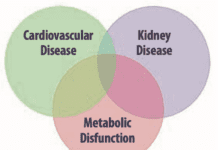Two new studies suggest ways that lifestyle changes can help postmenopausal women reduce their risk of breast cancer.
In one study, National Cancer Institute researchers report that women who were physically active at least seven hours a week over the previous 10 years were 16% less likely to develop breast cancer than inactive women. Tricia M. Peters, MPhil, and colleagues analyzed data on 118,899 postmenopausal women participating in the NIH-AARP Diet and Health Study. Over a 6.6-year follow-up, a total of 4,287 participants were diagnosed with breast cancer; 84% of these cancers were estrogen receptor- positive tumors, which are more likely to grow in a high-estrogen environment.
Only recent, higher-intensity exercise-such as swimming, tennis or jogging- was associated with lower risk of developing breast cancer. It wasnt just that more active women were less likely to be overweight: Controlling for body mass index (BMI) in middle age had little effect on the data, suggesting an independent effect due to exercise. But exercise earlier in life at any level and less-intense or less-frequent physical activity were not linked to any significant risk reduction.
Peters commented, The results that more recent physical activity appears to influence breast cancer risk suggests that it might not be too late for postmenopausal women who increase their physical activity to reduce their risk of breast cancer.
She added that the findings about intense exercise were consistent with possible biological mechanisms for the benefit. These possible explanations include altered hormone levels, effects on insulin and insulin-like growth factors, enhanced immunity and reduced chronic inflammation.
In the second new study, French researchers found that avoiding a Western-style diet-high in meat, fast food, starches, dairy fats, eggs and alcohol- might help postmenopausal women reduce their risk of breast cancer. The study compared an alcohol/Western diet to an eating pattern focused instead on fruits, vegetables, seafood and olive or sunflower oil. Except for alcohol, this resembles whats commonly called the Mediterranean diet, and researchers dubbed it the healthy/ Mediterranean dietary pattern.
Marie-Christine Boutron-Ruault, MD, PhD, of the Institut de Cancrologie Gustave Roussy and colleagues followed 65,374 older French women for an average of 9.7 years. During that timespan, 2,381 of the women were diagnosed with invasive breast cancer.
The women whose diets most closely matched the alcohol/Western pattern were 20% more likely to develop breast cancer; this association was especially strong for estrogen-receptor positive tumors. On the other hand, those following the healthy/Mediterranean diet were 15% less likely to develop breast cancer.
Dr. Boutron-Ruault and colleagues noted that breast cancer incidence varies widely between countries, suggesting an important role for diet and other environmental factors. Japan, they pointed out, has traditionally seen one of the lowest rates for breast cancer; as a Western diet has grown in popularity in Japan, however, breast cancer incidence has risen.
TO LEARN MORE: BMC Cancer, vol. 9; online at www.biomedcentral.com/1471-2407/9/349. American Journal of Epidemiology; abstract at aje.oxfordjournals.org/cgi/content/abstract/ kwp257.























